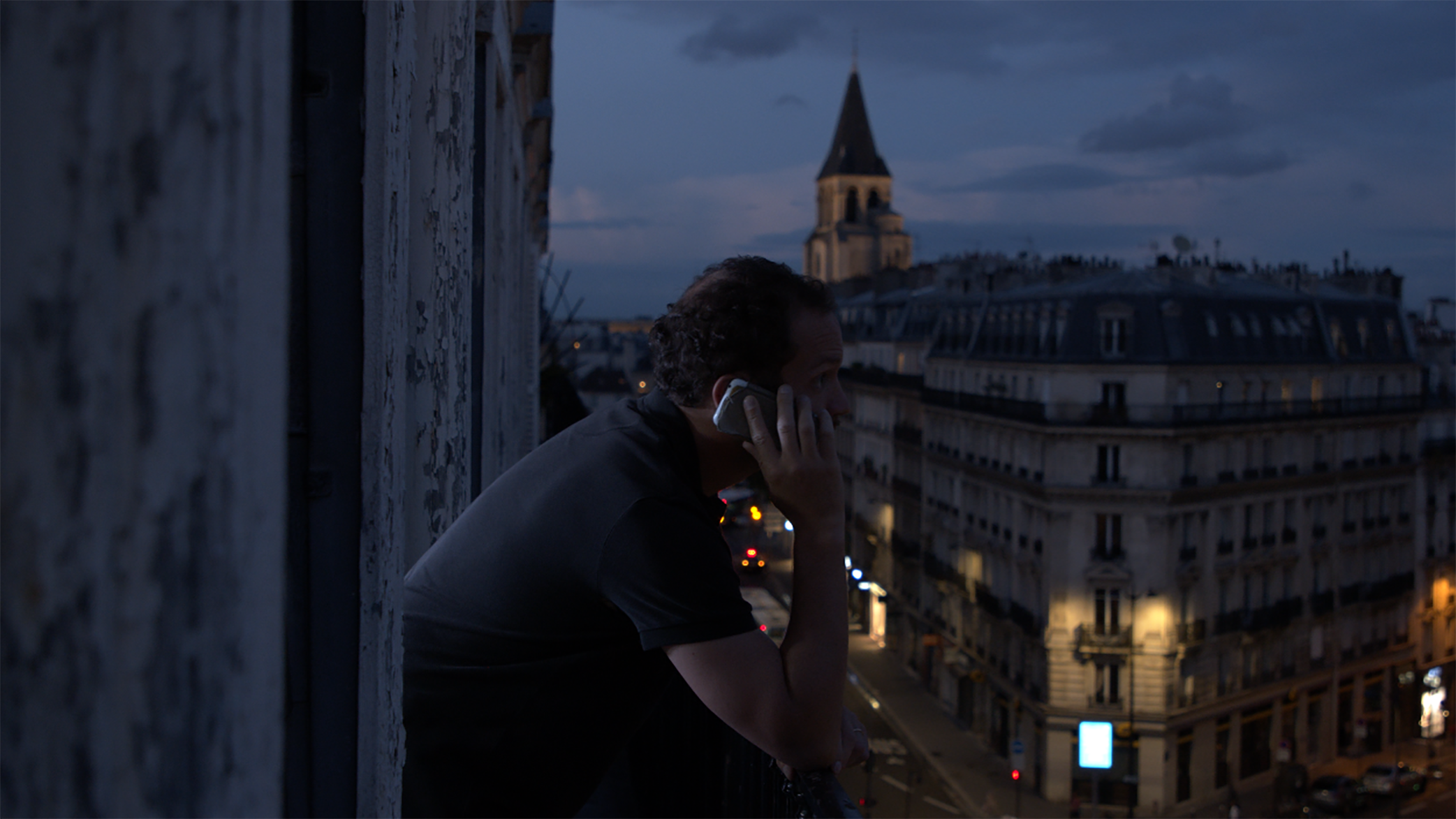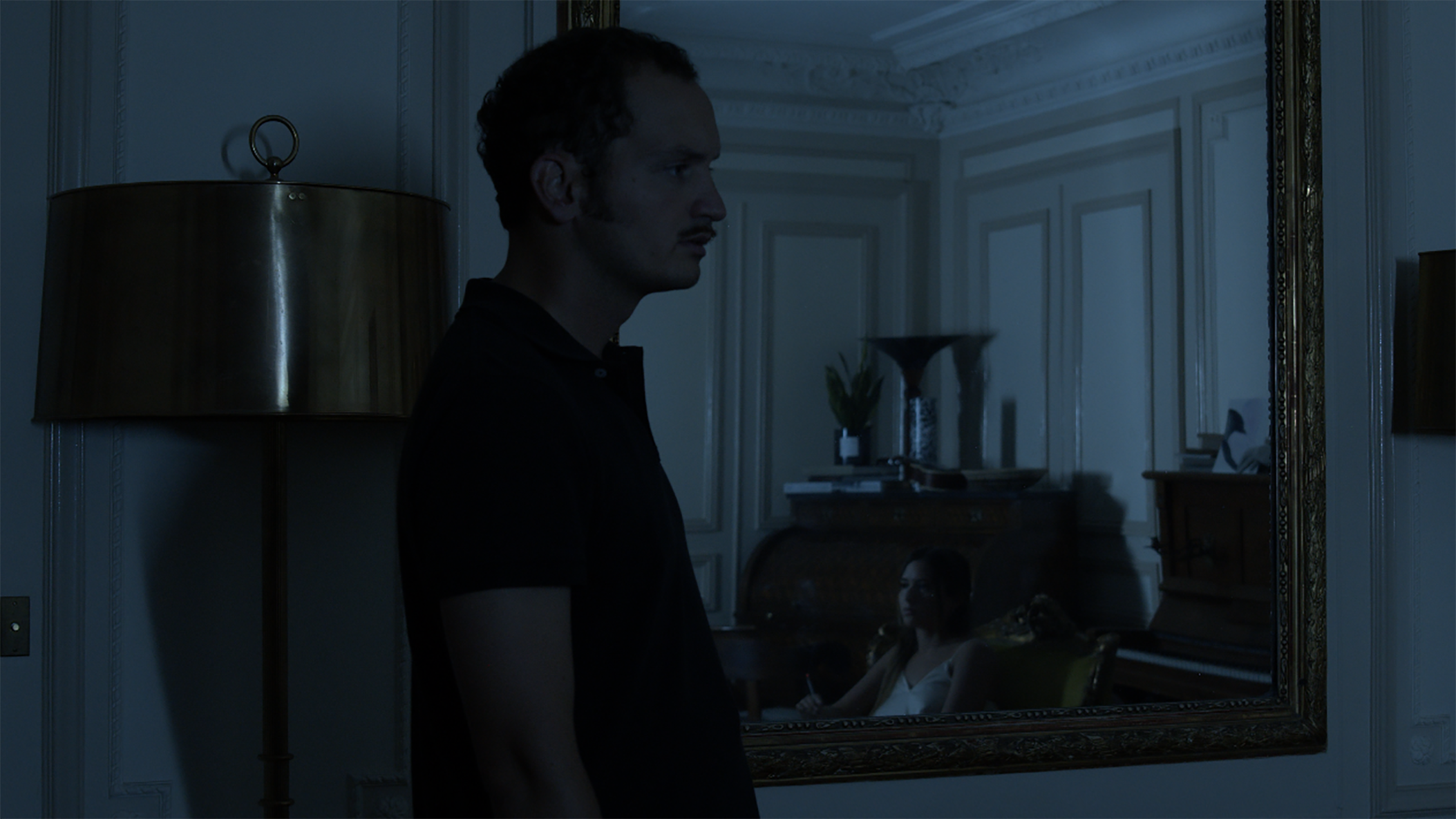無言
Speak in a Whisper
202235 mins

We open with two characters who differ in mentality. This difference stems from various dichotomies; their demeanour, philosophy, and socio- economic background. The protagonist, Céleste, is a painter from a wealthy family–she is also deaf. Her husband, Max, is an activist from a troubled background; who fights against the injustices imposed by the system against the disenfranchised.
![]()
From the opening, we are introduced to the issue addressed in SANS MOTS -
a story about depression, exacerbated by the communication difficulty that two individuals may encounter in a relationship. The spectator is immediately immersed in an oppressive atmosphere–a dull void. At dusk, we inhabit a luxurious Parisian apartment in the 6th arrondissement. We see fragments of a plate on the floor in a large kitchen. Water flows in silence; no one is visible.
Later in the bathroom, we find the protagonists; Céleste injured her finger when she broke a plate, and Max is treating the wound. Is this a coincidence? Or a metaphor for an imminent collapse in their relations.
The plot then comes to fruition; Céleste initiates a discussion in LSF (French Sign Language) with Max, the significance of which escapes Max entirely. Celeste's wait to confess to Max about the abortion she had gone through 2 weeks prior mirrors Max's fear of confiding in her over the guilt he has for having seen her as a burden. Inevitably, things reach their tipping point–that irreversible moment when words can’t be silenced, and the truth comes out to spite the one who utters it.The relationship between these two individuals, shaken by ineffable divides and lack of communication, already forms in itself a microcosm; subject to political scrutiny that could be enlarged to be seen to comment on society at large. The positions taken by the characters are used both in a symbolic and socio-political context. Their conversation reveals the difficulty, if not the impossibility, that arises when we try to change our perspective. How far can we detach ourselves from our most intimate certainties, thoughts and feelings, even within a romantic relationship?
![]()
The actress who plays Céleste is deaf in real life. The cinematographic language utilised will accompany her through long takes, where subtle camera movements will punctuate her performance and underline a progressive distortion of time. Wherein, the succession of shots will reflect the psychological state of the main character. The importance of the ambience and the alternation between verbalised and signed words reinforce this feeling of estrangement.
In SANS MOTS, Céleste represents the “outsider”; all those who find themselves marginalised in our society for one reason or another.
Excluded from the able-bodied world by her handicap, Max's lack of listening inflicts further penalties upon him. The fear of becoming a burden in the balance of the relationship reinforces the depression she suffers from and echoes this internal collapse.
These feelings, which are often inexplicable, even inexpressible, are phenomena that are extremely present in our daily lives.
Being an international student who feels more and more distant from her own culture, I find myself questioning my socio-cultural background. I incorporated this confusion about defining my identity into the role of Celeste - seeing myself as an outsider.
In fact, when I participated in one of the demonstrations against the "global security law" in Paris, although I wanted to show my presence and express my opinion, something prevented me from doing so. An uneasiness about my legitimacy to fight in my host country was mixed with the awareness of inequalities and the omnipresence of surveillance in my native country. The gulf between the issues here in France and in China has caused me to become apathetic. Inspired by these doubts, I wrote a scene where Céleste questions Max about his commitment to bringing about real change in our society. When is the right time to act? How should we begin? How strong is our voice?
Both Celeste and Max wait for the best moment to begin a dialogue, but the longer they wait, the more they lose themselves in uncertainty.Although time can help us to take a step back and restore a kind of equilibrium, this step can also take away from us all forms of spontaneity and, ultimately, the very strength needed to take action.
Having myself gone through a depressive episode that I could not face when I was living through it, I was able to take a step back and moreobjectively see the complexity of these characters and the origin of their conflicts.
I thus came to my main objective for this short film project:
Although everyone's pain is different and impossible to compare, crossing through the fields of memory from a distance–thereby creating lucidity– has made it possible for me to illuminate these darker experiences and hopefully ameliorate this trauma for others who may see themselves in Celeste.

From the opening, we are introduced to the issue addressed in SANS MOTS -
a story about depression, exacerbated by the communication difficulty that two individuals may encounter in a relationship. The spectator is immediately immersed in an oppressive atmosphere–a dull void. At dusk, we inhabit a luxurious Parisian apartment in the 6th arrondissement. We see fragments of a plate on the floor in a large kitchen. Water flows in silence; no one is visible.
Later in the bathroom, we find the protagonists; Céleste injured her finger when she broke a plate, and Max is treating the wound. Is this a coincidence? Or a metaphor for an imminent collapse in their relations.
The plot then comes to fruition; Céleste initiates a discussion in LSF (French Sign Language) with Max, the significance of which escapes Max entirely. Celeste's wait to confess to Max about the abortion she had gone through 2 weeks prior mirrors Max's fear of confiding in her over the guilt he has for having seen her as a burden. Inevitably, things reach their tipping point–that irreversible moment when words can’t be silenced, and the truth comes out to spite the one who utters it.The relationship between these two individuals, shaken by ineffable divides and lack of communication, already forms in itself a microcosm; subject to political scrutiny that could be enlarged to be seen to comment on society at large. The positions taken by the characters are used both in a symbolic and socio-political context. Their conversation reveals the difficulty, if not the impossibility, that arises when we try to change our perspective. How far can we detach ourselves from our most intimate certainties, thoughts and feelings, even within a romantic relationship?

The actress who plays Céleste is deaf in real life. The cinematographic language utilised will accompany her through long takes, where subtle camera movements will punctuate her performance and underline a progressive distortion of time. Wherein, the succession of shots will reflect the psychological state of the main character. The importance of the ambience and the alternation between verbalised and signed words reinforce this feeling of estrangement.
In SANS MOTS, Céleste represents the “outsider”; all those who find themselves marginalised in our society for one reason or another.
Excluded from the able-bodied world by her handicap, Max's lack of listening inflicts further penalties upon him. The fear of becoming a burden in the balance of the relationship reinforces the depression she suffers from and echoes this internal collapse.
These feelings, which are often inexplicable, even inexpressible, are phenomena that are extremely present in our daily lives.
Being an international student who feels more and more distant from her own culture, I find myself questioning my socio-cultural background. I incorporated this confusion about defining my identity into the role of Celeste - seeing myself as an outsider.
In fact, when I participated in one of the demonstrations against the "global security law" in Paris, although I wanted to show my presence and express my opinion, something prevented me from doing so. An uneasiness about my legitimacy to fight in my host country was mixed with the awareness of inequalities and the omnipresence of surveillance in my native country. The gulf between the issues here in France and in China has caused me to become apathetic. Inspired by these doubts, I wrote a scene where Céleste questions Max about his commitment to bringing about real change in our society. When is the right time to act? How should we begin? How strong is our voice?
Both Celeste and Max wait for the best moment to begin a dialogue, but the longer they wait, the more they lose themselves in uncertainty.Although time can help us to take a step back and restore a kind of equilibrium, this step can also take away from us all forms of spontaneity and, ultimately, the very strength needed to take action.
Having myself gone through a depressive episode that I could not face when I was living through it, I was able to take a step back and moreobjectively see the complexity of these characters and the origin of their conflicts.
I thus came to my main objective for this short film project:
Although everyone's pain is different and impossible to compare, crossing through the fields of memory from a distance–thereby creating lucidity– has made it possible for me to illuminate these darker experiences and hopefully ameliorate this trauma for others who may see themselves in Celeste.
